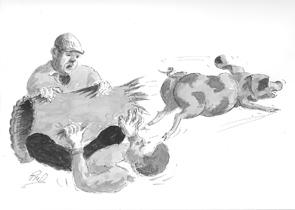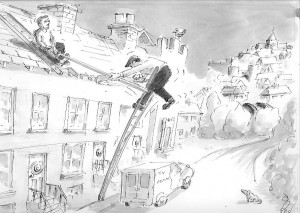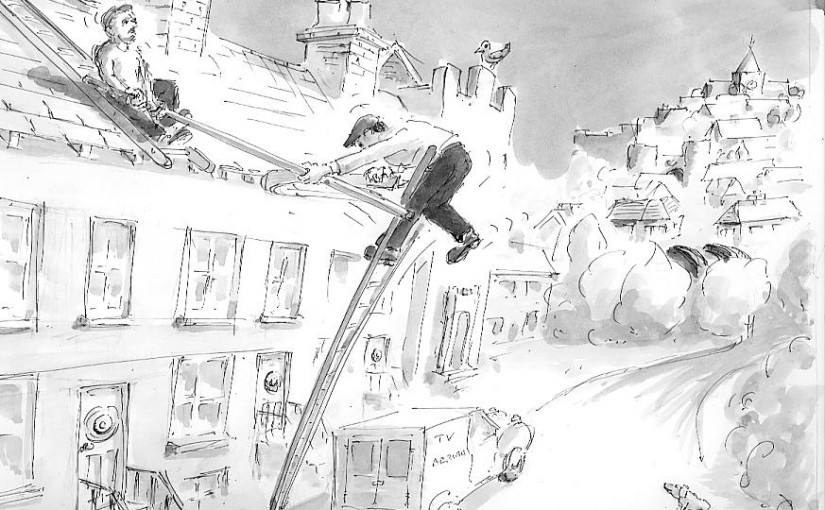Drawings by Paul Vincent
Times were Tough in the 1950’s
Times were tough, it was hard to earn enough cash window cleaning and chimney sweeping to support a family of five in Rye during the early fifties.
The father and son business operated from their council home on Tilling Green and consisted of a prewar Ford van, two sets of ladders, steps, buckets, sweep’s brush and rods. They worked hard but at seven shillings to sweep a chimney and a shilling to clean a set of bay windows, upstairs and down, they could only make ends meet when the weather was fine in the summer and during the early winter months when chimneys needed sweeping.
To supplement their income they tried various other money raising schemes from ‘sorting peas’ for Stonhams agricultural warehouse, (the whole family and many other Rye families, took on this job at seven shilling a hundredweight) to ‘rooning’ (gathering mushrooms from neighbouring fields in the hours just after dawn) and sometimes a bit of painting and decorating.
They even attempted raising chickens, pigs and a calf on a small holding at West Undercliff which cost them just £5 for a year’s rent. This ended in near disaster. 200 day old chicks were raised and eventually ‘capernised’ plucked and sold to The Mermaid at a barely break even price. A calf purchased at Rye Market for thirty-two shillings, virtually ate them out of house and home until it was re-sold in the same market three months later for? …Thirty Two Shillings! 24 Guinea Fowl ‘flew the roost’ and perched in trees surrounding the small holding. Despite enormous efforts by youngest son Richard, who was promised all the cash he got selling them to the butchers, not one was caught and there are still wild Guinea Fowl living in the west undercliff area to this day!

Two weaner pigs that were raised at great effort nearly killed the boys when they tried to catch them to take to the butchers at Broad Oak. Father had the amazing idea of getting each pig in a strong sack, leaving their heads out with a rope tied round their necks. Of course it did not work. The pigs had grown to an enormous size, they were strong and fit and were not at all amused. In desperation they tried it the other way round, fitting the animals in head first. The largest pig was selected as the first to be subdued in this fashion, it went in the sack okay but burst out through the other end at 100 miles an hour. After a long rethink and a call to the butcher, they backed the van up to the sty and just lifted the front end of each animal onto the back of the van, the rear legs followed. It was as simple as that, both porkers stood patiently in the moving vehicle as they drove the six miles to Broad Oak, except for the hot breath and slobber down their neck our heroes delivered the pair and were rewarded by a small profit. Farming was not for them, they passed on the small holding to another would be farmer.
“Mr. Wilson the Television Man wants to know if we can put up aerials for him?” It was father, putting the question to his wife Win and Young Jim who, with the rashness of youth, was all for it, but Win was worried. It was bad enough with her two senior men cleaning windows off ladders but working on roofs would be even more dangerous. The money would be good. £5 an aerial. This factor eventually got her reluctant agreement.
The next day they started. It was a time of expansion in the budding television market. People were just recovering from the exertions of the War, both physically and financially. Televisions were still very expensive but were emerging from their infancy into a desirable and, for some, attainable commodity. Aerials were enormous, huge great H shaped aluminium contraptions that had to gather the only signal available which was transmitted from Alexander Palace in London. There was but one programme to watch, the BBC. It transmitted programmes during the evening only. During the day all that was available for the aerial erectors to tune into was a ‘test signal’ and music. The transmission was in monochrome, colour was not even on the horizon in 1957.
Mr. Wilson supervised the first job. It was a bungalow at Camber. The aerial had to be at least 30′ up to have a chance of getting a signal. He decided it must go on a 20′ wooden pole with a 10′ aluminium pole bracketed on top that would carry the ‘H’. Jim Snr. was not happy with the set up. The wooden pole had been shaved to fit into a sleeve that bracketed the two poles together. “Its too weak” Jim told Arthur Wilson, but Arthur insisted all would be well once the guy wires were in position and supporting it.
The job was completed and Arthur gave the bottom of the pole a huge shake. “See!” he said “Its fine”. There was an enormous crack and the poles parted, the guy wires were no use to Arthur as the aerial plunged down and smacked him across the nose. It was a bloody sight but he survived. The job was eventually completed using three 10′ metal poles. It was very noticeable that from then on he left the erecting entirely to the boys and only appeared to tune the set in when the job was completed. They never told Win of the accident.

‘Health and safety’ was unheard of fifty years ago and the two men had their own system of ensuring their own safety while completing the job in the shortest possible time. Their system was quite simple. The large extending wooden ladder was placed against the building over the gutter, a hessian pillow was positioned on the roof and the other wooden extending ladder, in one or two pieces as was dictated by the length of the roof, was pushed up the roof and slotted over the top of the large ladder. Both father and son would go up the ladder together and with Jim Snr. supporting the roof ladder with his shoulders whilst gripping the gutter board, Young Jim climbed to the chimney. A double bracket would be fitted round the stack and then father descended to ground level to get the aerial while his son sat on the ridge tiles. The aerial was brought up to roof level and son came down the ladder to collect it and balance it like a juggler as he placed it in the brackets. A few turns with a spanner and the job was completed.
They performed this act together on dozens of occasions without the slightest mishap until, one fine April morning, they were fixing an aerial in Brassknocker Row, Military Road. These were high buildings with spiked railings guarding the basements. The job was going fine, the bracket had been fixed tightly around the stack and Young Jim climbed the roof ladder holding the pole with aerial affixed in front of him. Half way up, the ladder slipped and slid down the roof. With great presence of mind, he hooked the aerial around the chimney and his feet under a rung of the ladder, the movement stopped. He looked over his shoulder and saw his father four feet out from the building, still holding a section of gutter board and gutter which had pulled away from the wall. He was almost upright and in great danger as the ladders could have overbalanced in either direction. “Pull me in steady son” was all he said. Young Jim did just that, going hand over hand on the aerial pole until his father had returned to the original position.
They completed the job and the lad used the aerial cable, securely fixed to the bracket, as a ‘safety rope’ on his descent to the gutter. They made good the gutter board and re-fixed the gutter joints but it wasn’t before they were both safely on ‘terra firma’ that they grinned at each other. They went on to do another three aerials that week but looked closely at how the gutter boards were united with the wall before going ‘over the top’.
In later years, when they had their own family television business, Robert, son number two, was the aerial erector. He became famous in the town for turning 100 aerials in one day on Tilling Green when the new Independent Television transmitter at Dover opened. Jim Snr. knocked on door after door, offering to turn the aerial for five shillings. Nearly all accepted the offer, blocks of flats were favourite, the ladder went up once for just four flats, Robert walked along the ridge tiles from one chimney to another, it was an example of entrepreneurial enterprise that would not be permitted in these days of rules and regulations that are slowly but surely making it impossible for small and even medium size businesses to survive.
Giant conglomerates can afford to implement new ‘safety’ measures and regulations, all they do is put the price up to their customers. What was considered ‘safe’ last week is deemed a ‘health hazard’ today and a new list of expensive measures have to be implemented.
In 1960 it was fun to be in business.
Reprinted from the June 2007 issue of Rye’s Own
